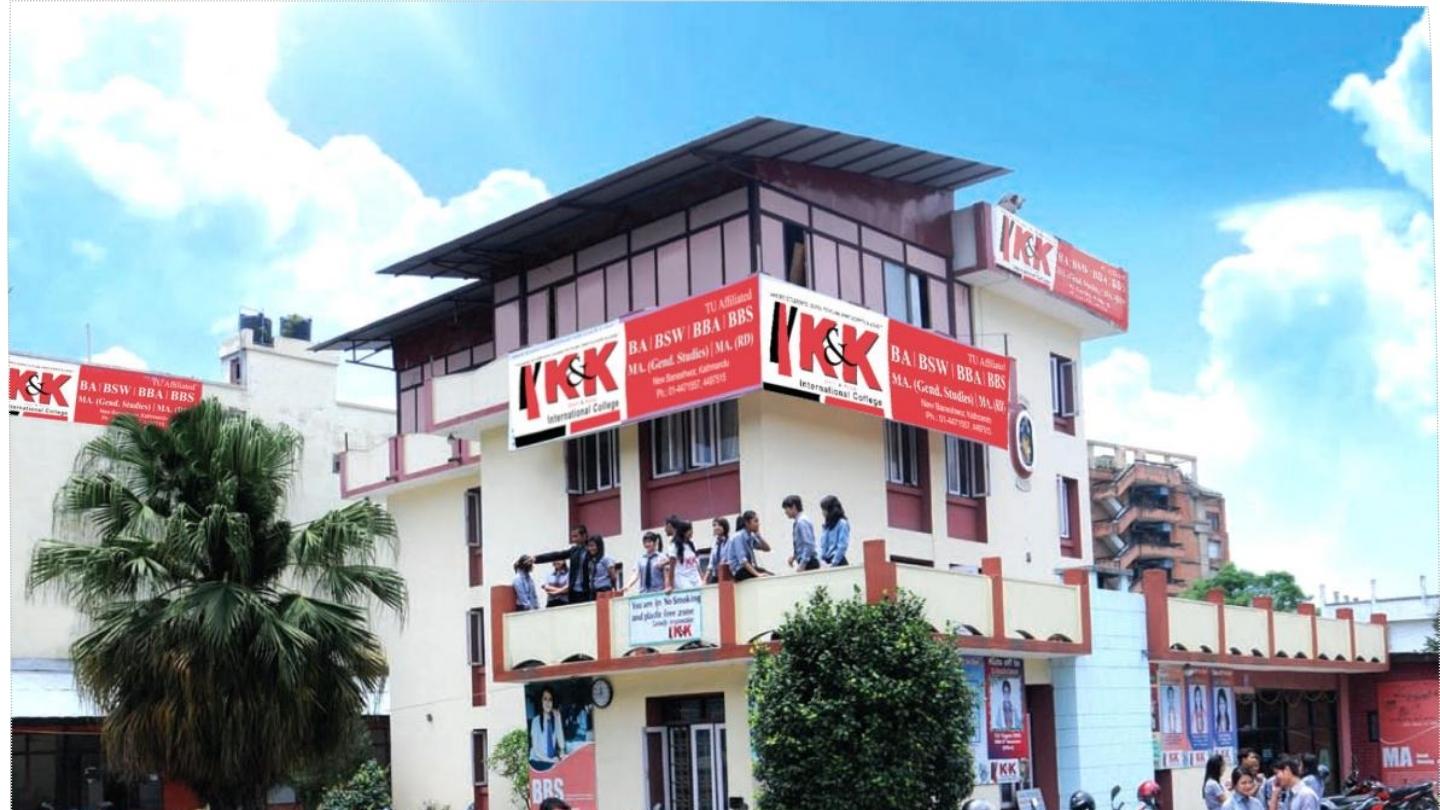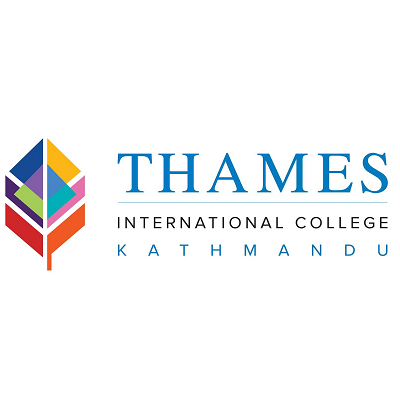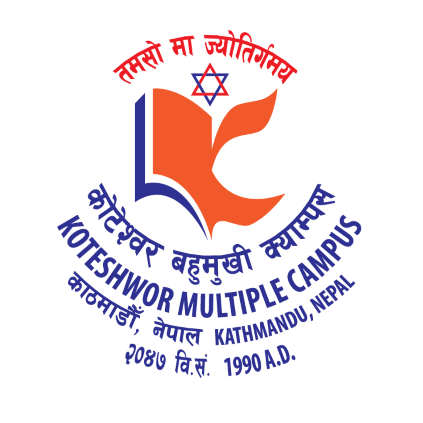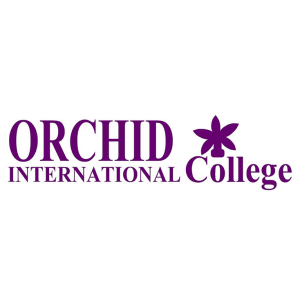Overview
BA in Rural Development (BA-RD) at K and K International College, New Baneshwor, Kathmandu
The BA in Rural Development (BA-RD) at K and K International College (K&K), New Baneshwor, Kathmandu, runs under Tribhuvan University’s Faculty of Humanities and Social Sciences. The program serves students who want clear, verifiable knowledge about rural development in Nepal.
The four-year structure covers theory, field exposure, local governance, project planning, community organization, natural resources, research methods, and communication skills that support real work in rural settings.

Overview
This BA-RD profile supports your need for precise, non-promotional information. The curriculum follows TU rules, and K&K conducts classes, assessments, and field activities within that framework. Students learn core concepts first, then apply them in short field tasks and guided coursework. The New Baneshwor location opposite BICC helps daily commuters manage study schedules alongside family or part-time responsibilities.
Highlights
-
Program length: Four academic years under Tribhuvan University
-
Affiliation: Faculty of Humanities and Social Sciences (FoHSS)
-
Academic focus: Rural development theory, local governance, project planning, community organization, environment, research methods
-
Learning mode: Classroom study with field exposure and short applied tasks
-
college support: Library access, computer lab, scheduled classrooms, clubs and sports in New Baneshwor
Curriculum Details
K&K follows TU’s current four-year BA framework, which replaced older three-year versions. Course work progresses from foundations to applied modules, ending with guided research and a small field-linked project.
Foundations
Students study introductory rural development, basic economics for development contexts, sociology/anthropology perspectives, and academic writing. Classes train you to read policy notes, interpret tables and graphs, and write short analyses tied to local cases.
Governance and Institutions
Modules explain how local governments function within Nepal’s federal structure. Topics include planning cycles, ward-level coordination, budgeting basics, and public accountability. Students read selected legal or policy excerpts and prepare brief summaries that connect rules to village or municipal practice.
Project Planning and Management
Courses cover problem identification, stakeholder mapping, logical frameworks, activity scheduling, budgeting, and monitoring. Short tasks include drafting a simple problem tree, a one-page results chain, and a basic Gantt chart for community activities such as water, sanitation, or livelihood support.
Community Organization and Participation
Students explore group formation, savings and credit groups, cooperatives, and inclusive participation. Classroom work links to short field observations where available. Outputs may include a participation checklist, a meeting note, and a reflection on representation of women, youth, and marginalized groups.
Environment and Natural Resources
Modules introduce watershed basics, soil and water conservation, forest user groups, and climate-linked risks. Students practice writing a one-page environmental note that identifies local issues, affected households, and simple mitigation steps within policy limits.
Research Methods and Communication
Teaching covers questionnaires, basic sampling ideas, key-informant interviews, and observation notes. Students learn to produce clean tables, brief charts, and short memos that explain findings without jargon. A small field-linked project ties method, data, and a simple conclusion into a compact report.
Objectives
The BA-RD aims to help students:
-
Understand rural development concepts, institutions, and planning cycles in Nepal.
-
Analyze local problems using basic data and clear reasoning.
-
Prepare short, structured documents that support decisions.
-
Engage with communities respectfully and document meetings accurately.
-
Follow ethical steps for fieldwork, data handling, and citation.
Scope
Graduates enter roles in local NGOs, cooperatives, social enterprises, and projects linked to agriculture, livelihoods, WASH, education support, or basic infrastructure. Some work with municipal offices or ward committees as program assistants or enumerators. Others apply for development-focused master’s degrees after gaining work experience with clean documentation from field tasks and a compact research report.
Learning Outcomes
By graduation, students typically can:
-
Map stakeholders and write a short problem statement for a village-level issue.
-
Draft a simple plan with activities, timelines, and a budget outline.
-
Collect basic field data and produce clear tables and charts.
-
Write concise memos, meeting minutes, and a short policy summary.
-
Present findings to peers using a five- to ten-minute talk with slides.
Skill Development Modules
Coursework builds skills in reading policy, using spreadsheets, writing memos, and preparing short presentations. Instructors share a course plan each term with internal tasks and deadlines. Lab hours support charting and formatting, while classroom practice builds confidence in speaking and group coordination.
Micro-checklist for steady progress
-
Weekly plan: Keep a two-page log per subject (concepts, examples, questions).
-
Field notes: Record date, place, who you met, three key points, and next steps.
-
Data habit: Convert notebook tallies into a clean table the same day.
-
Writing: Produce a 250–400 word brief after each reading or field visit.
-
Speaking: Deliver one five-minute update per course before mid-term.
Teaching Methodology
Teaching balances short lectures, examples, and group work. Internal tasks include attendance, quizzes, assignments, presentations, and a term paper or brief field report where assigned. The approach helps you move from definitions to applied outputs in small steps. Students learn to meet deadlines, maintain field logs, and keep sources cited properly.
Admission Requirements
-
Eligibility: Completion of grade 12 or equivalent from a board recognized by Tribhuvan University. Documents must show subjects taken and grades/division.
-
Selection: K&K follows TU rules and may schedule a short screening or counseling session.
-
Documents: Mark sheets and character certificates for grades 10, 11, and 12; recent photos; valid ID; any forms announced during the intake cycle.
Before you apply
-
Collect records: Scan mark sheets, ID, and photos into a single folder.
-
Track notices: Note submission deadlines and any screening dates.
-
Prepare a note: List local development topics you care about for discussion during counseling.
Career Opportunities
Early roles include program assistant, enumerator, community mobilizer, social research assistant, monitoring support, and cooperative facilitator. Organizations look for clear writing, reliable attendance, and accurate field records. Your term papers, field notes, and the small project report become writing samples for applications and interviews.
Scholarships and Financial Aid
Scholarship notices are issued during admission. Categories can include merit and need-based support under published rules. Students should prepare citizenship or ID, academic records, and any supporting letters requested for screening. Deadlines follow the intake calendar, so early submission helps.
Why Choose This Course?
Students who want a structured, Nepal-focused path into development work find BA-RD steady and clear. The program advances from basic theory to short, applied tasks that match entry-level responsibilities. The New Baneshwor college near BICC supports commuters, and college facilities—library, lab access, and scheduled classrooms—help you finish assignments, charts, and presentations on time.
Conclusion
The BA-RD at K&K follows Tribhuvan University’s framework. You study institutions, planning, environment, and community organization, then apply that learning in short field tasks and a compact research report. Careful attendance, weekly planning, and clean documentation help you finish the degree with usable outputs—tables, briefs, minutes, and slides—that support both job applications and further study.
FAQ
What is the length of the BA-RD at K&K?
Four academic years under Tribhuvan University’s Faculty of Humanities and Social Sciences.
Does the curriculum include field exposure?
Yes. Courses assign short field tasks and brief reports aligned to rural settings.
Which skills are most valued in this course?
Clear writing, basic data handling, stakeholder mapping, and meeting documentation for community work.
What kind of entry roles do graduates take?
Program assistant, enumerator, community mobilizer, social research assistant, monitoring support, and cooperative facilitator.
Which facilities support study on college?
The library, computer lab, and scheduled classrooms in New Baneshwor support reading, charts, and presentations.






















